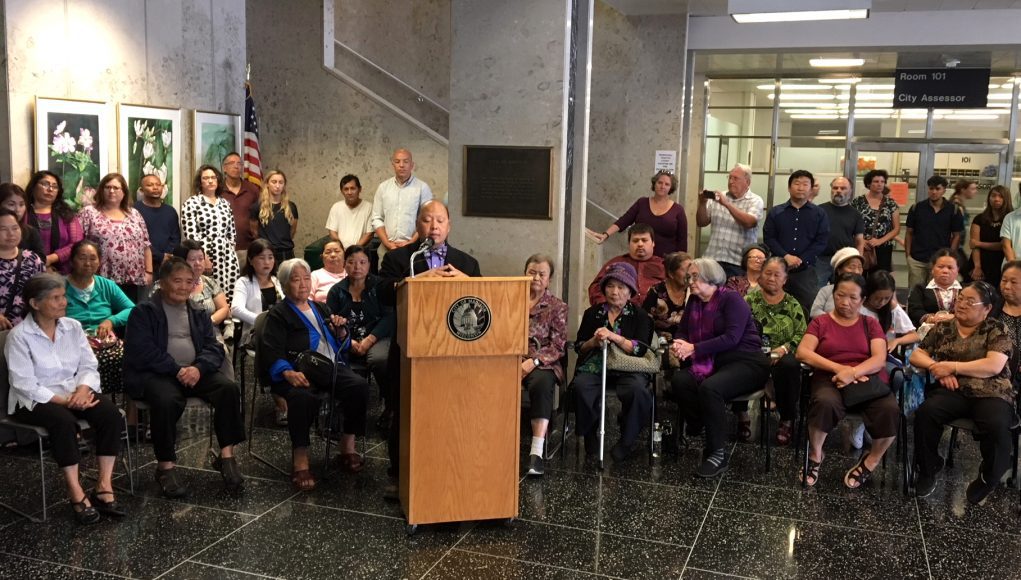“I’m very sad right now. I have no one to help me at home. I have no support system. Everything from going to the doctor, looking at my paper that comes at home, to taking me to places … everything on a daily basis surrounding my life depends upon Kajsiab House. Kajsiab House is a place that takes care of me and I don’t have to worry because I don’t speak English and I don’t have a family system here to support me and I don’t have other relatives to support me. Kajsiab is my home.”
Bao Xiong cried while speaking, through a translator, about the incredible impact the Kajsiab (pronounced ka-sheea) House has had on her life. She spoke to a large crowd that gathered at the City-County Building Sept. 4 and was one of a variety of community members from the Hmong and Cambodian communities that gathered for a press conference to address and respond to Journey Mental Health Center’s recent decision to close both Kajsiab House and the Cambodian Temple, another Journey program, on Sept. 28.

“We’re here today because we are very concerned about the closing of Kajsiab House and the Cambodian Temple in 30 days,” said Mai Zong Vue, opening the press conference. “This leaves very little room for us to figure out what to do to help maintain services for our elderly who are the most vulnerable [and] to our veterans and our widows.”
The Cambodia program is located at the Cambodian Temple. Roughly 1,000 Khmer people relocated to the Madison area in the late 1970s and early to middle 1980s following the tragic Pol Pot revolution in Cambodia.
“Between 1975 and 1979, at least 1.7 million people were killed during the Pol Pot Khmer Rouge – the killing fields – from execution, starvation, and disease. They broke up communities and families,” said Peng Her, CEO of The Hmong Institute said. “These are just some of the challenges and troubles that many of these clients and patients faced and needed to be addressed.
“The Kajsiab House was established 30 years ago with the advice and consultation of the Hmong community. Closing both the Kajsiab House and the Cambodian Temple would be a step back,” he added.
The Kajsiab House will officially close services down on Sept. 28 which will mean over 400 residents will be without culturally competent mental health services. Nancy Vue-Tran, director of Grants and Development at Freedom Inc., said that many of the clients she sees at Freedom Inc. are also clients of Kajsiab House.
“We do not have clinicians. We do not have mental health services and medication and that is what they get at Kajsiab House,” she said. “Many of the clients that are impacted by the closing of Kajsiab House need wraparound services that include mental health services, crisis planning, social services such as housing insurance and citizenship assistance.

“Journey has not provided a proper transitional plan for their patients, many of whom have been with Kajsiab House since it began 18 years ago,” she added. “This utter disregard for our elders and veterans is an outrage and we won’t accept it. We need to ask these questions: Why is Journey closing down a successful program? Why hasn’t Journey spoken to any of the elders individually about their transition plans or given staff more than 30 days to look for alternative ways to keep patient services going?”
The Hmong and Cambodian communities are close-knit, she added. “We do not want to see our elders and our families suffer. We know already that the closing of Kajsiab House has already affected many of these patients’ health,” Vue-Tran said. “Many have been hospitalized due to the re-triggered of their PSTD from war trauma.
Kajsiab House was established in 2000 to provide wrap-around services and case management for clients with mental illness to the disabled, Hmong veterans, and elderly, many whom suffer from PTSD and the trauma of fighting for the U.S. during the Vietnam War. The Cambodian program started in 1990 to provide similar services to the Cambodia community who are survivors of the Cambodian genocide under Pol Pot.
“We must be a society that treats our elders and veterans with respect and honor and as a community. We need to keep those doors open so that they know what the next day holds for them,” Vue-Tran said.










